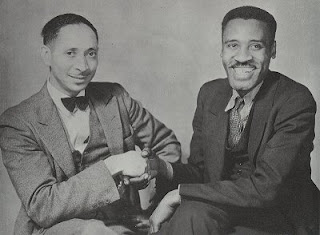Hudson Whittaker (January 8, 1903 – March 19, 1981), known as Tampa Red, was an American Chicago blues musician.
He is best remembered as a blues guitarist who had a distinctive single-string slide style. His songwriting and his bottleneck technique influenced other leading Chicago blues guitarists, such as Big Bill Broonzy, Robert Nighthawk and Muddy Waters, and many others, including Elmore James and Mose Allison. In a career spanning over 30 years, he also recorded pop, R&B and hokum songs. His best-known recordings include "Anna Lou Blues", "Black Angel Blues", "Crying Won't Help You", "It Hurts Me Too", and "Love Her with a Feeling".
Red was one of the most prolific blues recording artists of his era. It has been estimated that he recorded 335 songs on 78-rpm records, of which 251 were recorded between 1928 and 1942, making him the blues artist with the most recordings during that period. Most of his singles were released before Billboard magazine began tracking blues (and other "race music") in October 1942, and accurate sales records are not available. However, he had four singles that placed in the R&B top ten between 1942 and 1951.
Tampa Red was born Hudson Woodbridge in Smithville, Georgia. His parents died when he was a child, and he moved to Tampa, Florida, where he was raised by his aunt and grandmother and adopted their surname, Whittaker. He emulated his older brother, Eddie, who played the guitar, and he was especially inspired by an old street musician called Piccolo Pete, who first taught him to play blues licks on the guitar.
In the 1920s, having already perfected his slide technique, he moved to Chicago, Illinois, and began his career as a musician, adopting the name "Tampa Red", with reference to his childhood home and his light-coloured skin. His big break came when he was hired to accompany Ma Rainey. He began recording in 1928, with "It's Tight Like That", in a bawdy and humorous style that became known as hokum. His early recordings were mostly collaborations with Thomas A. Dorsey, known as Georgia Tom. The two recorded almost 90 sides, sometimes as the Hokum Boys or, with Frankie Jaxon, as Tampa Red's Hokum Jug Band.
In 1928, Red became the first black musician to play a National steel-bodied resonator guitar, the loudest and showiest guitar available before amplification, acquiring one in the first year in which they were available. This allowed him to develop his trademark bottleneck style, playing single-string runs, not block chords, which was a precursor of later blues and rock guitar soloing.
The National guitar he used was a gold-plated tricone, which was found in Illinois in the 1990s by Randy Clemens, a music shop owner and guitarist, and later sold to the Experience Music Project in Seattle. Red was known as "The Man with the Gold Guitar", and into the 1930s he was billed as "The Guitar Wizard". In 1931, Red recorded "Depression Blues", including the topical lyrics, "If I could tell my troubles, it would give my poor heart ease, but Depression has got me, somebody help me please".
 |
| Tampa Red & Leroy Carr |
By the 1940s, Red was playing an electric guitar. In 1942, his "Let Me Play with Your Poodle", was a number 4 hit on Billboard's new "Harlem Hit Parade", a forerunner of the R&B chart. His 1949 recording "When Things Go Wrong with You (It Hurts Me Too)", another R&B hit, was covered by Elmore James. He was "rediscovered" in the blues revival of the late 1950s, like many other surviving early-recorded blues artists, such as Son House and Skip James. He made his last recordings in 1960.
His wife's death in 1953 was a blow from which Tampa Red never recovered. He had always been a heavy drinker, and his alcoholism became acute. Like many of his contemporaries, he was "rediscovered" by a new audience in the late 1950s. He went back into the studio in 1960, but his final recordings were undistinguished. He died destitute in a Chicago Nursing Home on March 19, 1981 from a heart attack, and was inducted into the Blues Foundation's Hall of Fame the same year. He is buried in Glenwood, Illinois.
(Edited mainly from Wikipedia)







